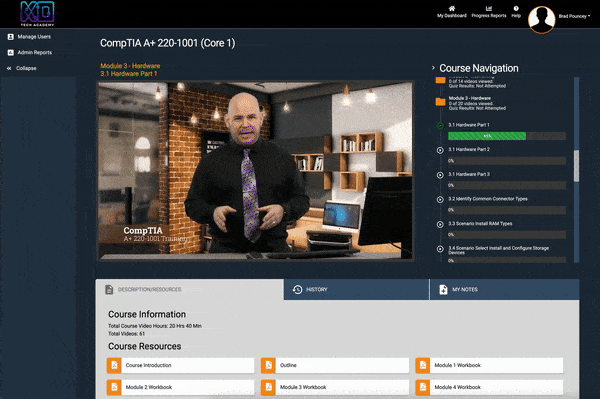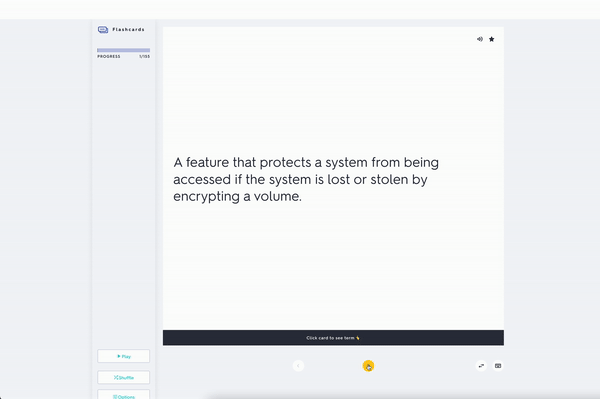Train to start an awesome Project Management career with skills that follow you anywhere.
$1,797.00
Our course bundle makes it super easy for you to step into your career by giving you everything you need to get started:

You’ll begin your journey in our online training platform, where you’ll get everything you need to ace your first few industry certifications - and access for a year to continue education!
As you approach testing day, you’ll have interactive learning tools and comprehensive workbooks with pages of notes to review to ensure you pass with flying colors.


During your certification training & your project manager job search, you’ll have access to our online student & alumni group, where you can connect with folks to pair study or find new opportunities out in the field.
Unlock the knowledge to jumpstart your new Project Management career today!






Course 1
The Agile Project Management training module provides the basics of Agile with emphasis on the Scrum style. It also provides students with a working understanding of how the philosophies and principles of Agile are used in successful projects. It is intended for project professionals who are either using Agile principles in their work or wish to include the principles, tools, and techniques in the future.
Course 2
Agile Scrum is the most popular hybrid of AGILE as it provides a framework that allows teams to address complex adaptive problems, while efficiently and creatively delivering products, services, or results of the highest possible value to their internal and external customers.
This module provides a basic understanding of Agile Scrum principles and tools and techniques used in implementing Agile Scrum in a coordinated fashion to ensure successful project outcomes.
Course 3
The PMP credential is the most widely accepted professional certification in the world and its framework has set the standard for the project management profession for the past 30 years.
The purpose of this program is to prepare experienced project management team members to take the PMP (Project Management Professional) certification examination. The emphasis is on explaining the PMI (Project Management Institute) best practices for project management across the continuum from predictive through adaptive life cycles as proposed in the 6th edition PMBOK (Project Management Body of Knowledge).
Course 4
Globally recognized and demanded, the PMI-RMP fills the need for a specialist role in project risk management. This module is in preparation for the PMI Risk Management Professional (PMI-RMP) exam. This credential is a solution to project management’s increasing growth, complexity, and diversity. This module is based off of the 6th Edition of the PMBOK.
This certification recognizes the professional’s unique expertise and competency in assessing and identifying project risks, mitigating threats, and capitalizing on opportunities, while still possessing a core knowledge and practical application in all areas of project management.
Course 5
Six Sigma uses a rigorous and systematic methodology known as DMAIC (define, measure, analyze, improve, and control) and several qualitative and quantitative tools for driving process, product, and service improvements aimed at reducing defects and variation.
A certified Lean Six Sigma Green Belt is a professional who is trained in Lean Six Sigma methodologies and tools and can implement and sustain high-impact projects.
Six Sigma Green Belts are the employees who take up Six Sigma implementation along with their other job responsibilities, operating under the guidance of Black Belts. A student who has mastered the principles of the Six Sigma Green Belt can move up with our Six Sigma Black Belt course.
Course 6
After this course, students will learn how the Certified Six Sigma Black Belt is a professional who can explain Six Sigma philosophies and principles, including supporting systems and tools. Black belts have a thorough understanding of all aspects of the define, measure, analyze, improve and control (DMAIC) model in accordance with Six Sigma principles.
Get an entire year to study the course materials, and use the practice labs to learn everything you need to know for certification.
Study comprehensive workbooks with hundreds of pages of notes covering every video topic to help you learn easily.
Enjoy detailed lessons taught by experienced certified IT instructors who guide you every step of the way.
Discover interactive study materials in every course including flash cards and matching games to help you master every subject.
Learn exactly what you need to prepare yourself for the most powerful, in-demand, project management certifications in existence.
Join us in our free, private Facebook community to connect with other students who are starting new careers just like you.
As soon as you purchase! After we receive payment, you’ll be sent a voucher code via email from KO Tech Academy with the subject line “You received a new voucher code”. It typically takes a couple hours for processing on our end, so don’t panic if you don’t receive your voucher code immediately. Once you’ve received your voucher code, follow the instructions in the email to setup your account and access your Learning Management System (LMS) Dashboard.
You get to work! Once you’ve created your account and accessed your dashboard, you’re free to start taking your courses and accessing all of your materials. Remember you have full access for an entire year!
There is no restriction on what order you take your courses in, but we definitely recommend taking the courses in order. They’re designed to build on each other as you progress and learn more and more.
For IT & Cybersecurity, we recommend the following order:

The Online Training You Need to Launch Your Tech Career
You can receive 25% off of any course purchase.
Email any form of military or official, professional identification to support@kotechacademy.com for verification.